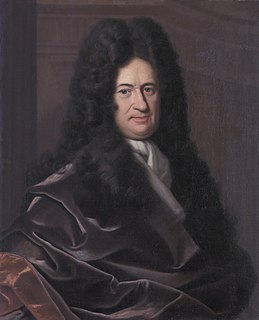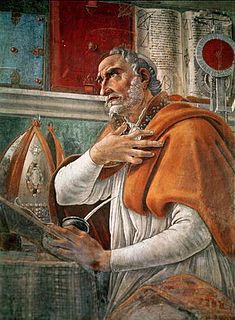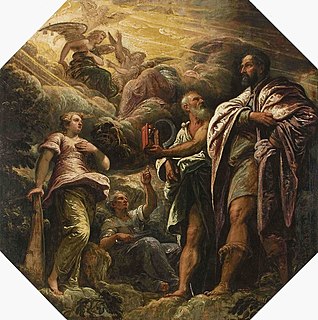Harold Samuel Kushner is a prominent American rabbi aligned with the progressive wing of Conservative Judaism, and a popular author.
The incompatible-properties argument is the idea that no description of God is consistent with reality. For example, if one takes the definition of God to be described fully from the Bible, then the claims of what properties God has described therein might be argued to lead to a contradiction.
Panentheism is the belief that the divine pervades and interpenetrates every part of the universe and also extends beyond time and space. The term was coined by the German philosopher Karl Krause in 1828 to distinguish the ideas of Georg Wilhelm Friedrich Hegel (1770–1831) and Friedrich Wilhelm Joseph Schelling (1775–1854) about the relation of God and the universe from the supposed pantheism of Baruch Spinoza. Unlike pantheism, which holds that the divine and the universe are identical, panentheism maintains an ontological distinction between the divine and the non-divine and the significance of both.
The problem of evil is the question of how to reconcile the existence of evil with an omnipotent, omnibenevolent and omniscient God. An argument from evil claims that because evil exists, either God does not exist or does not have all three of those properties. Attempts to show the contrary have traditionally been discussed under the heading of theodicy. Besides philosophy of religion, the problem of evil is also important to the field of theology and ethics.

Theism is broadly defined as the belief in the existence of the Supreme Being or deities. In common parlance, or when contrasted with deism, the term often describes the classical conception of God that is found in monotheism – or gods found in polytheistic religions—a belief in God or in gods without the rejection of revelation as is characteristic of deism.
Misotheism is the "hatred of God" or "hatred of the gods". In some varieties of polytheism, it was considered possible to inflict punishment on gods by ceasing to worship them. Thus, Hrafnkell, protagonist of the eponymous Hrafnkels saga set in the 10th century, as his temple to Freyr is burnt and he is enslaved, states that "I think it is folly to have faith in gods", never performing another blót (sacrifice), a position described in the sagas as goðlauss, "godless". Jacob Grimm in his Teutonic Mythology observes that:
It is remarkable that Old Norse legend occasionally mentions certain men who, turning away in utter disgust and doubt from the heathen faith, placed their reliance on their own strength and virtue. Thus in the Sôlar lioð 17 we read of Vêbogi and Râdey á sjálf sig þau trûðu, "in themselves they trusted".

Holocaust theology is a body of theological and philosophical debate concerning the role of God in the universe in light of the Holocaust of the late 1930s and 1940s. It is primarily found in Judaism. Jews were killed in higher proportions than other groups; some scholars limit the definition of the Holocaust to the Jewish victims of the Nazis as Jews alone were targeted for the Final Solution. Others include the additional five million non-Jewish victims, bringing the total to about 11 million. One third of the total worldwide Jewish population were killed during the Holocaust. The Eastern European Jewish population was particularly hard hit, being reduced by ninety percent. While a disproportionate number of Jewish religious scholars were killed, more than eighty percent of the world's total, the perpetrators of the Holocaust did not merely target religious Jews. A large percentage of the Jews killed both in Eastern and Western Europe were either nonobservant or had not received even an elementary level of Jewish education.
Muʿtazila is a rationalist school of Islamic theology that flourished in the cities of Basra and Baghdad, both now in Iraq, during the 8th to the 10th centuries.
The problem of Hell is an ethical problem in religion in which the existence of Hell for the punishment of souls is regarded as inconsistent with the notion of a just, moral, and omnibenevolent God. It derives from four key propositions: that Hell exists; that it is for the punishment of people whose lives on Earth are judged to have sinned against God; that some people go there; and there is no escape.
The existence of God is a subject of debate in the philosophy of religion and popular culture.

The phrase "the best of all possible worlds" was coined by the German polymath Gottfried Leibniz in his 1710 work Essais de Théodicée sur la bonté de Dieu, la liberté de l'homme et l'origine du mal. The claim that the actual world is the best of all possible worlds is the central argument in Leibniz's theodicy, or his attempt to solve the problem of evil.
Adalah means justice and denotes the Justice of God. It is among the five Shia Principles of the Religion.
Theological determinism is a form of predeterminism which states that all events that happen are pre-ordained, or/and predestined to happen, by a God/gods, or that they are destined to occur given its omniscience. Theological determinism exists in a number of religions, including Jainism, Judaism, Christianity and Islam. It is also supported by proponents of Classical pantheism such as the Stoics and Baruch Spinoza.
Liberal theism is the philosophical and religious belief in the existence of a deity without adhering to an established religion.
Dualism in cosmology is the moral or spiritual belief that two fundamental concepts exist, which often oppose each other. It is an umbrella term that covers a diversity of views from various religions, including both traditional religions and scriptural religions.

The Augustinian theodicy, named for the 4th- and 5th-century theologian, philosopher and Saint Augustine of Hippo, is a type of Christian theodicy designed in response to the evidential problem of evil. As such, it attempts to explain the probability of an omnipotent (all-powerful) and omnibenevolent (all-good) God amid evidence of evil in the world. A number of variations of this kind of theodicy have been proposed throughout history; their similarities were first described by the 20th-century philosopher John Hick, who classified them as "Augustinian". They typically assert that God is perfectly (ideally) good; that he created the world out of nothing; and that evil is the result of humanity's original sin. The entry of evil into the world is generally explained as punishment for sin and its continued presence due to humans' misuse of free will. God's goodness and benevolence, according to the Augustinian theodicy, remain perfect and without responsibility for evil or suffering.
The Evil God Challenge is a thought experiment. The challenge is to explain why an all-good god should be more likely than an all-evil god. Those who advance this challenge assert that, unless there is a satisfactory answer to the challenge, there is no reason to accept God is good or can provide moral guidance.

In religion, ethics, philosophy, and psychology "good and evil" is a very common dichotomy. In cultures with Manichaean and Abrahamic religious influence, evil is usually perceived as the dualistic antagonistic opposite of good, in which good should prevail and evil should be defeated. In cultures with Buddhist spiritual influence, both good and evil are perceived as part of an antagonistic duality that itself must be overcome through achieving Śūnyatā meaning emptiness in the sense of recognition of good and evil being two opposing principles but not a reality, emptying the duality of them, and achieving a oneness.









